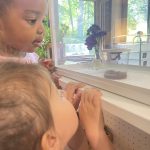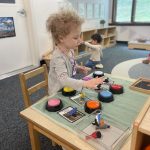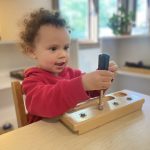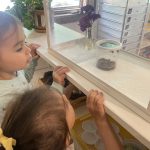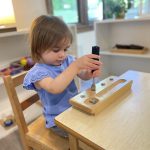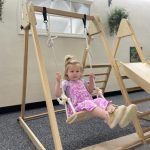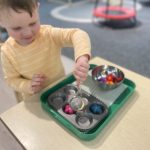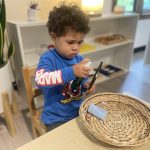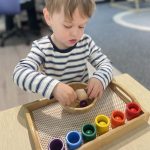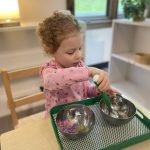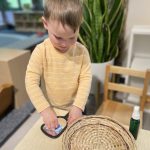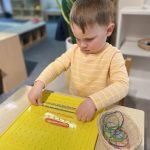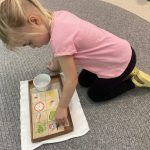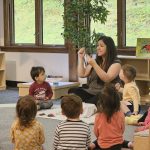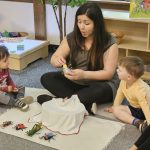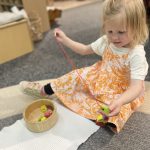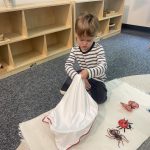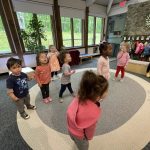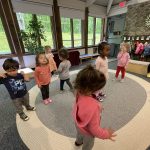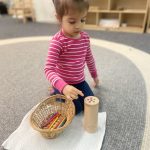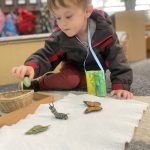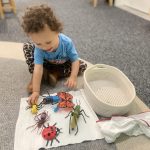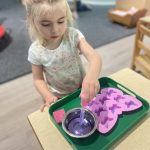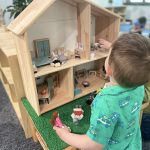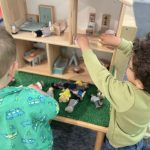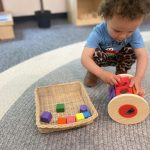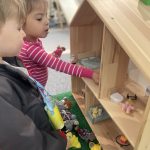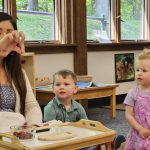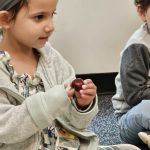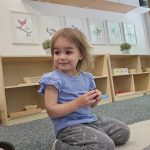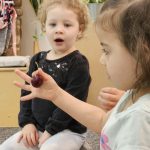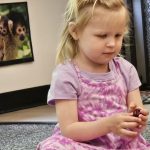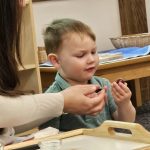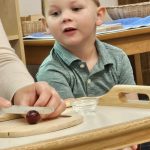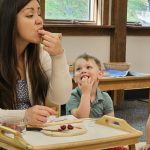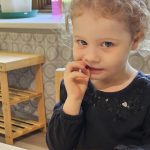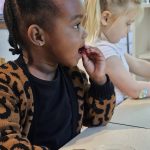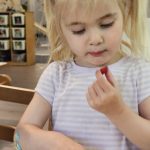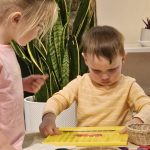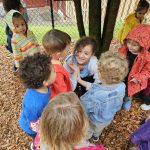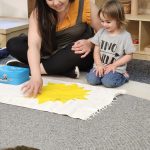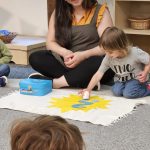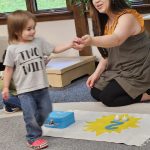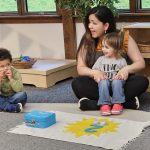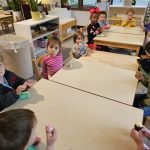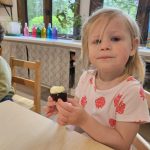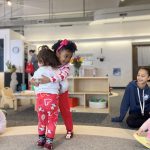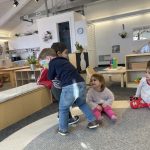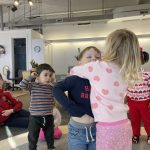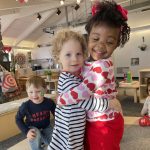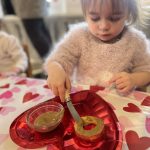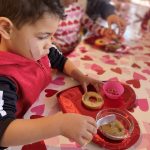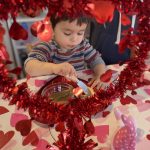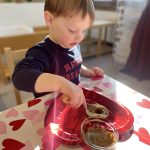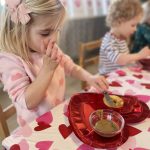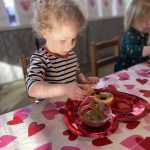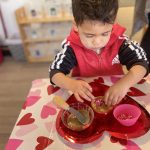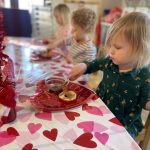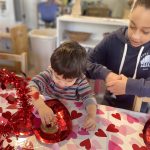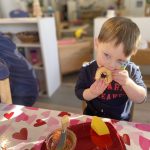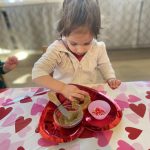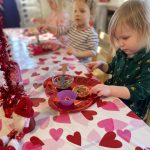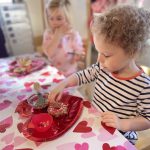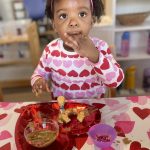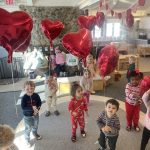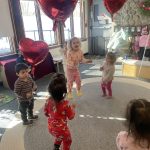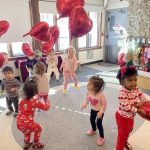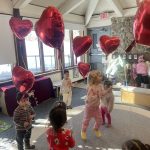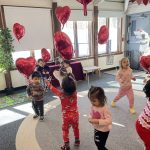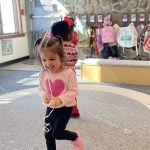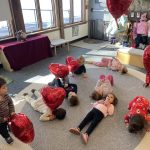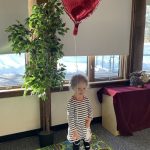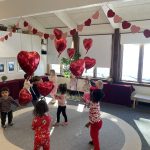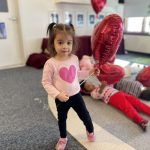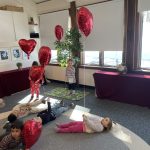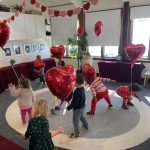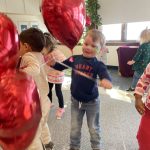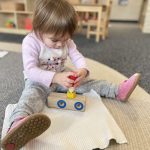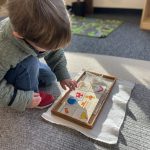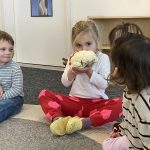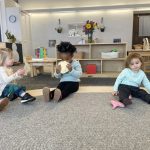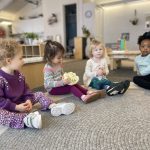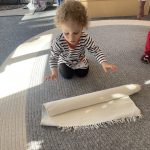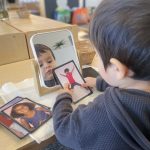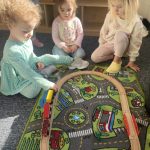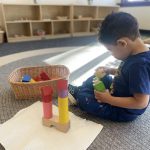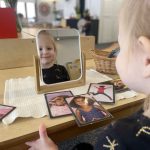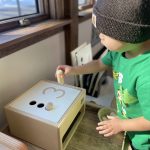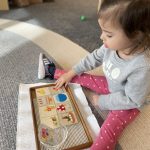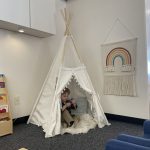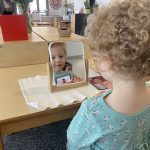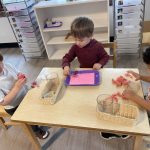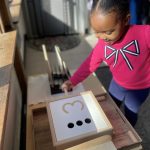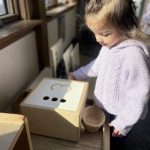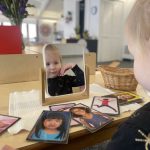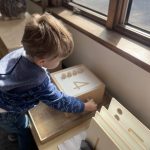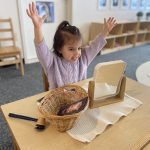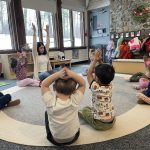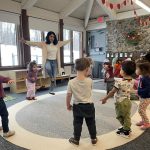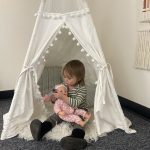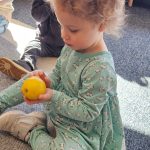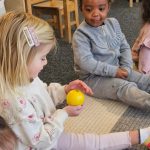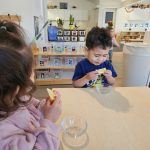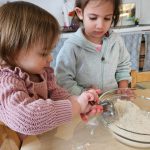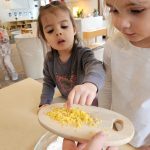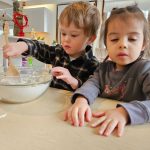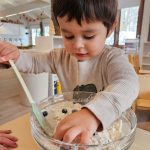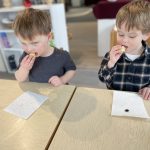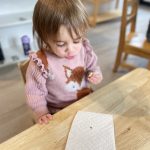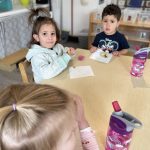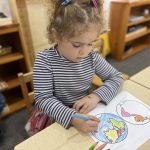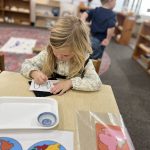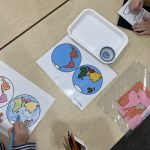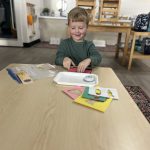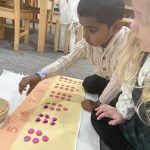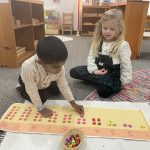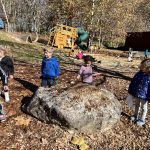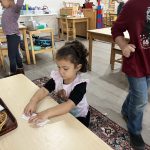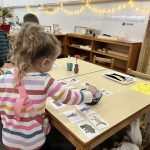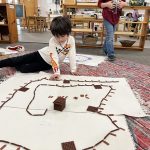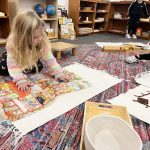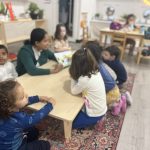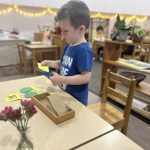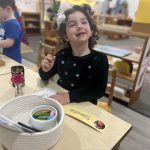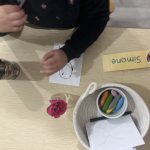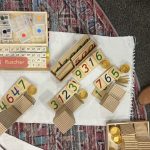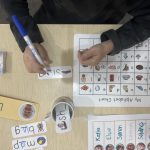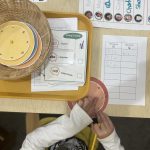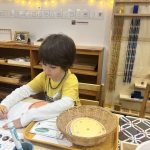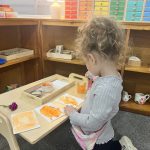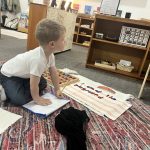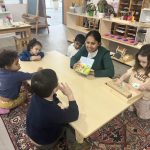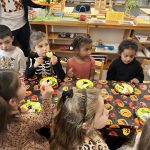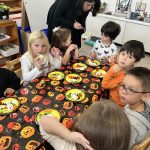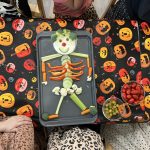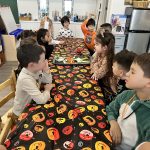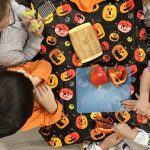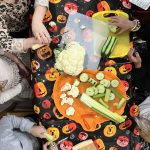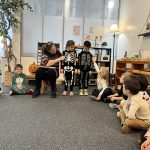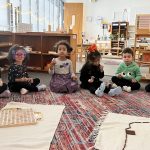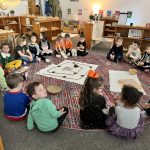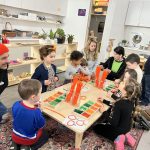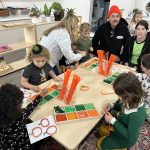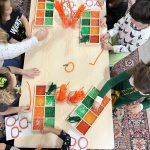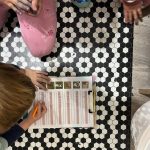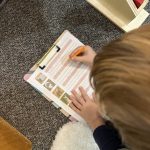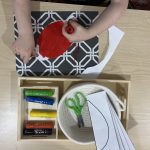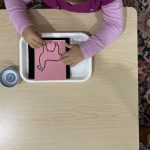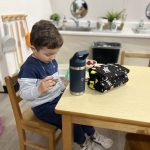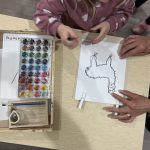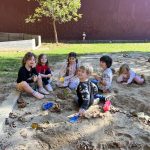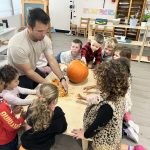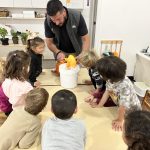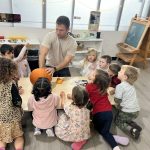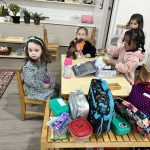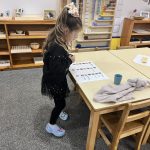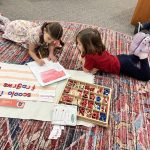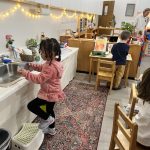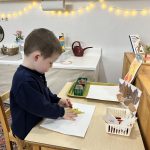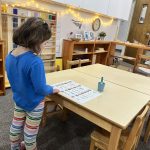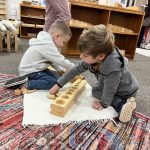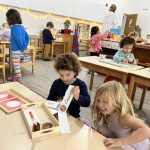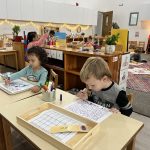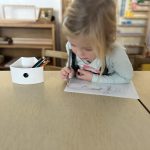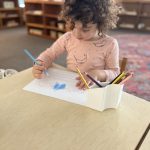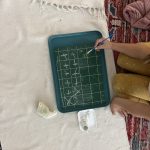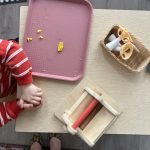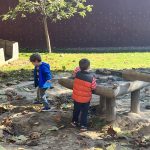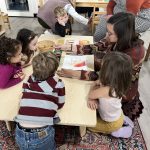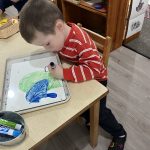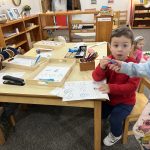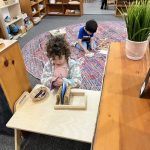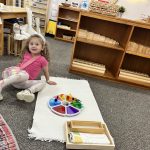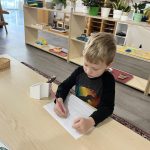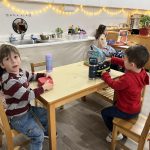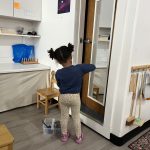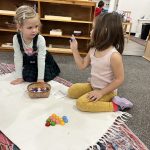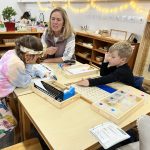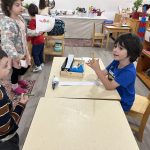-
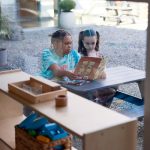
-
Learning together: Book Buddies create meaningful connections through shared stories, with Montessori materials providing rich learning contexts for both partners.
-
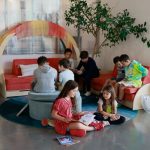
-
Our inviting indoor reading spaces create the perfect environment for Book Buddies partnerships to flourish, fostering community connections across all age groups at Fraser Woods Montessori.
-
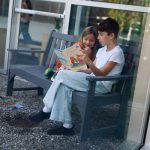
-
Mixed-age magic: An Upper Elementary student shares “The Berenstain Bears New Pup” with his kindergarten Book Buddy, demonstrating the mentorship that makes Montessori education special.
-
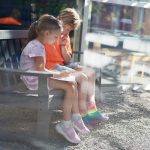
-
Book Buddies in action: Fraser Woods students share the joy of reading on our beautiful 8-acre campus in Newtown, CT.
Building Bridges Through Books: The Magic of Fraser Woods Montessori’s Book Buddies Program
In the warm, light-filled spaces of Fraser Woods Montessori School in Newtown, Connecticut, something beautiful unfolds each week as younger and older students come together for a shared love of reading. The school’s Book Buddies program exemplifies the Montessori philosophy of mixed-age learning, creating meaningful connections that extend far beyond the pages of a book.
This innovative program demonstrates why Fraser Woods Montessori School has been a leader in authentic Montessori education throughout Fairfield County for over 55 years, serving students from 15 months through 8th grade.
A Community United by Stories
The excitement is palpable when Fraser Woods’ kindergarten students are paired with their Book Buddies from the Upper Elementary classroom. As Mrs. Sargeant notes, “Our children were ecstatic about this endeavor and are eager to meet up with them again next week.” This enthusiasm captures the essence of what makes the Book Buddies program so special—it transforms reading from a solitary activity into a shared adventure.
The program brings together students from different grade levels, with kindergarten students paired with 5th graders, creating natural mentorship opportunities that benefit both age groups. In comfortable reading nooks, outdoor benches, and cozy classroom corners throughout our 8-acre campus in Newtown, these partnerships bloom as older students guide younger ones through the wonderful world of literature.
The Power of Reading Aloud in Montessori Education
Research consistently shows that reading aloud to children provides numerous cognitive and developmental benefits. In the Book Buddies program at Fraser Woods Montessori, older students read to younger students, helping them become familiar with reading and literacy while developing reading fluency, comprehension, and vocabulary through this 1-on-1 pairing.
Equally important is the practice young readers receive when they read aloud themselves. The National Reading Panel found that “repeated oral reading substantially improves word recognition, speed, and accuracy as well as fluency” and that guided oral reading exercises have “an appreciable positive effect” on reading achievement metrics. Studies demonstrate that oral reading practice also has the potential to boost learners’ reading comprehension, with research showing that children understand more through the process of oral rather than silent reading.
For optimal benefits, experts recommend that children engage in reading aloud practice for at least 15 minutes daily. This regular practice helps move words into automatic recognition, freeing up cognitive resources for comprehension. Research evidence shows that both reading a correct word aloud and accumulating multiple exposures to a word help move words into memory so readers can recognize them automatically in future readings.
When Upper Elementary students read books like “The Berenstain Bears New Pup” or other age-appropriate selections to their younger buddies, they’re not just sharing a story—they’re modeling proper reading techniques, expression, and the joy that comes from engaging with literature while simultaneously strengthening their own fluency skills. The younger students absorb not only the content but also the rhythm and flow of language, building crucial pre-reading skills, and may even take turns reading portions aloud themselves, further reinforcing the learning process.
Developing Leadership and Empathy Through Mixed-Age Learning
Mixed-age learning is a cornerstone of authentic Montessori education, and the Book Buddies program at Fraser Woods Montessori School demonstrates this principle beautifully. Older students become role models and mentors, developing leadership skills by guiding and supporting their younger buddies both in and out of the classroom. This responsibility helps Upper Elementary students mature in ways that traditional same-age interactions might not provide.
The program also nurtures critical social-emotional development. Students develop important social-emotional skills such as communication, patience, empathy, and understanding. Older students serve as role models to demonstrate healthy ways to regulate their emotions, and their younger buddies learn best practices for discovering and managing their own emotions.
This approach aligns perfectly with the Montessori philosophy that recognizes children learn best when they can teach and mentor others, creating a collaborative learning environment that benefits all participants.
Building School Community in Newtown’s Premier Montessori Environment
A Book Buddy program fosters community and connection amongst different age groups. The older students help make the youngest students feel like they are a part of the school community. Together, they develop respect, empathy, responsibility, and understanding. This sense of belonging is particularly important in a school environment, where younger students can sometimes feel overwhelmed or disconnected.
At Fraser Woods Montessori School in Newtown, CT, this community building aligns perfectly with the Montessori approach to education. The Fraser Woods Montessori curriculum is designed as a bridge between different levels, where each individual’s social, intellectual and emotional skill level is respected, and the Book Buddies program embodies this philosophy beautifully.
As an independent day school serving families throughout Fairfield County, Fraser Woods creates an inclusive community where students from toddler programs through middle school interact naturally and meaningfully.
Enhancing Listening and Responsibility Skills
The benefits of the program extend beyond just the act of reading. Younger students improve their listening and comprehension skills by hearing stories read aloud and discussing them with their older buddies. Concurrently, older students also improve their listening skills, as they become responsible mentors for their younger peers, making sure that they are heard and respected.
Older students learn to take responsibility for their younger buddies, which can translate to better personal responsibility in other academic and social-emotional areas. By serving as a role model, the older buddy also demonstrates responsibility to their younger buddy.
These skills are essential components of child-centered learning, where students develop not just academic capabilities but also the social and emotional intelligence needed for lifelong success.
Creating Lasting Memories and Love for Literature
Fraser Woods Montessori emphasizes taking excellent care of books, as they are special and delicate – some are even ancient, as they are some of the books that have been treasured since childhood. It is an absolute joy to witness the impact of literature on every child. This reverence for books and reading creates an environment where literature is valued and respected.
The program creates positive associations with reading that can last a lifetime. When a kindergartener snuggles up next to a fifth-grader to hear a beloved story, they’re not just learning about plot and characters—they’re learning that reading is something to be shared, enjoyed, and celebrated.
This love for learning and literature is one of the hallmarks that make Fraser Woods stand out among private schools in Fairfield County, creating lifelong learners who carry their passion for knowledge into their futures.
A Model for Cross-Age Learning in Montessori Education
The success of Fraser Woods’ Book Buddies program demonstrates the power of intentional cross-age interactions in educational settings. By creating structured opportunities for students of different ages to learn together, Montessori schools can foster the kind of authentic mentorship and community building that enhances the educational experience for all involved.
As captured in the warm, inviting spaces where these reading partnerships unfold—whether in comfortable indoor reading areas with colorful rainbow arches and cozy seating, or on outdoor benches throughout our beautiful 8-acre campus where natural light filters through—the Book Buddies program at Fraser Woods creates an environment where learning is joyful, collaborative, and deeply meaningful.
The program stands as a testament to the idea that Montessori education is not just about individual achievement, but about building community, fostering empathy, and creating connections that enrich the learning experience for everyone involved. In sharing stories, these students are also sharing themselves—building bridges that will serve them well beyond their school years.
Experience Mixed-Age Learning at Fraser Woods Montessori
The Book Buddies program is just one example of how Fraser Woods Montessori School in Newtown, Connecticut, creates meaningful learning experiences that extend beyond traditional academic instruction. Our authentic Montessori approach serves children from 15 months through 8th grade, fostering the whole child’s development in a nurturing, supportive environment.
Ready to see mixed-age learning in action? We invite families throughout Fairfield County to visit our campus and observe how programs like Book Buddies create lasting connections and inspire a love of learning that extends far beyond the classroom.
Discover Fraser Woods Montessori School
- Location: 173 South Main Street, Newtown, CT 06470
- Programs: Toddler (15 months) through Middle School (8th grade)
- Philosophy: Authentic Montessori education with mixed-age learning
- Campus: Beautiful 8-acre natural setting
- Community: Serving Fairfield County families since 1968
Schedule a campus tour to experience the magic of Montessori mixed-age learning and see why families throughout Newtown and Fairfield County choose Fraser Woods for their children’s educational journey.
Learn more about our programs or contact us to discover how your child can benefit from the unique learning environment at Fraser Woods Montessori School.




































